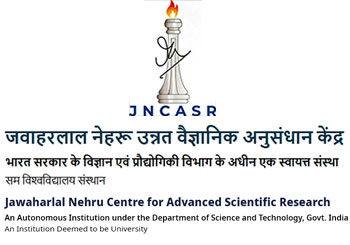T Govindaraju
T Govindaraju
Bioorganic Chemistry Laboratory
New Chemistry Unit and School of Advanced Materials (SAMat)
Jawaharlal Nehru Centre for Advanced Scientific Research (JNCASR)
Jakkur P.O., Bengaluru 560064, Karnataka, India
Education
M.Sc (1998-2000), Bangalore University, Bengaluru.
Ph.D. (2001-2005), National Chemical Laboratory, Pune.
Postdoctoral Research (2005-2006), University of Wisconsin-Madison, Madison, USA.
Alexander von Humboldt Foundation Research Fellow (2006-2008), Max Planck Institute of Molecular Physiology, Dortmund, Germany.
Research
Our research interests are at the interface of chemistry, biology and biomaterials science focussed on the theme of chemical biology of 'functional and disease amyloids'. With expertise in organic synthesis, peptide chemistry, bioconjugate chemistry, biophysical techniques and chemical biology, Our group has been engaged in solving challenging problems related to human health and society. Novel concepts and research themes in basic and applied interdisciplinary sciences have emerged from our laboratory.
Fundamental Chemistry of Biomolecules to Tackle Human Diseases

Our lab is effectively using tools from organic synthesis, biophysics, chemistry and chemical biology in tackling two classes of challenging problems currently relevant to human health and society:
- Our work on disease amyloids has led to the development of novel diagnostics of Alzheimer’s Disease (AD) that selectively detect AD and differentiate it from other neurodegenerative diseases, and a novel drug candidate molecule (TGR63) that has been demonstrated to be effective in notable reduction of amyloid burden in the AD brain and reverse cognitive decline in animal models and is now under clinical studies in collaboration with a pharmaceutical company with a promise to treat AD in humans.
- Our work on functional amyloids led to the development of silk-derived formulations for sustained in vivo insulin delivery, diabetic wound healing, skeletal muscles and neuronal tissue engineering, value addition to the sericulture industry and farmers. This work further inspired the concept of Molecular Architectonics which integrates the realms of molecules and derived nano-scale molecular architectures into functional biomaterials
At present there is no content available for this section, once content will be available would be updated.
- Back to previous page
- |
-
Page last updated date:26-03-2025 06:19 PM























